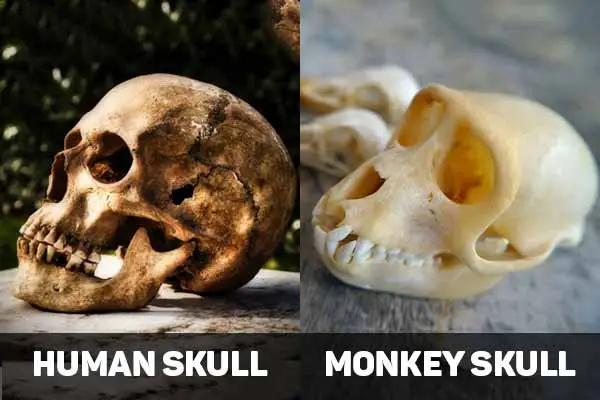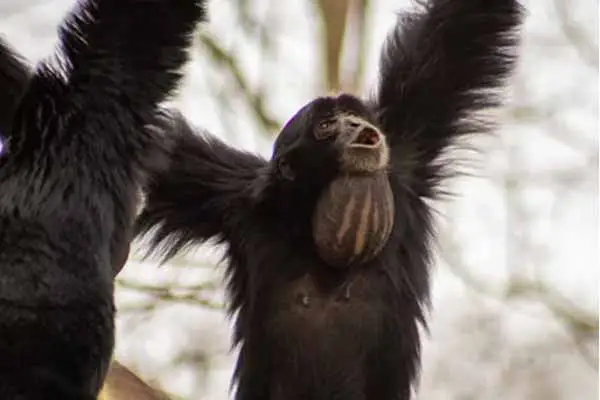When you think of what makes us humans unique, having a chin may come to mind. However, that forward-pointing part of the face below the mouth has been bugging scientists for years.
By the way, a jaw isn’t just the lower part of the face: It’s that little piece of bone extending from the jaw.
Since humans and some monkeys (macaques, for example) share about 93% of their DNA, it’s not hard to wonder: do monkeys have chins?
The simple answer is: no, monkeys do not have chins. Even though monkeys are primates, just like humans, they do not possess that jawbone protrusion. Humans are the only species with a chin; not even chimpanzees or gorillas have one.
The lower jaw (the mandible) of monkeys like the baboon, macaque, or mandrill slopes backward from the front teeth, instead of poking forward.

Scientists have given several explanations as to why monkeys do not have one but humans do.
One theory is that the chin helps with reproduction. Due to sexual selection, some features, like the chin, have evolved because they are attractive to the opposite sex.
For example, women may prefer men with broad chins because it might mean that the man is healthy and has good genes; a female narrow chin may mean that a woman has high levels of estrogen. Therefore men with broader chins get to reproduce more and leave offspring with broader chins as well.
Another explanation for humans having chins is that it helps protect the jaw from the stress of talking or chewing. The only problem with such a theory is that having a chin makes chewing worse. Due to the lower jaw structure (two halves joined in the middle), you’d want the opposite of a chin.
And monkeys seem to be a lot better at biting and chewing than us. Perhaps a tiny part to it is the skull shape and the lack of a chin?
How Strong Is A Monkey’s Bite?
Monkeys in general have strong jaws and powerful teeth. They also love to bite, especially if you are not very careful.
According to the World Health Organization 2018 report, monkey bites account for up to 20% of animal bite injuries; second only to dogs.
Baboons, one of the world’s largest monkeys, have strong jaws and a bite force of around 500 pounds per square inch (PSI).
Brown howler monkey, native to the forests of Brazil and Argentina, has a bite force of around 200 PSI.
One species of owl monkeys, the three-striped night monkey, has a bite force of just 50 PSI.
Geoffroy’s spider monkey, also known as the black-handed spider monkey, also has strong jaw muscles that can generate a bite force of around 255 PSI.
The endangered Kenyan monkey, the Tana River red colobus, has a bite force of around 400 PSI.
As a comparison, humans have an average bite force of around 162 PSI.
Some Primates Have Something Better Than A Chin

It might look like an extra chin or a throat, but one species of apes, called Siamangs, have a large gular sac (throat pouch) that can be inflated to the size of their heads. This allows them to make loud, resonating calls or songs.
You can check here the sounds Siamang gibbons make.
With a throat sack like that, who cares if monkeys and apes do not have a chin.
What is interesting about these gibbons is that they are excellent at swinging (brachiating) and will perform gymnastic wonders in the trees with ease.
Gorillas, on the other hand, are not that skilled with brachiating. Read more about it here.

Final Thoughts
Despite sharing similar structures, monkey and human skulls possess one very important difference.
Yes, the human skull might be flatter, but there’s one bone that’s protruding and that monkeys do not possess. That bone is the chin.
Monkeys might be primates, just as humans, but they do not have a chin – neither do other apes like the gorilla or a chimp.
Despite much chin-stroking and thinking about why monkeys do not have chins, scientists haven’t been able to come up with a definitive answer.
Whether it was a reproduction-driven decision, mechanical force, or a facial shape and size adaptation, it seems like something that will puzzle people for generations to come.
So do monkeys have chins? No, that’s a human privilege only.
Read More: Do monkeys show affection by kissing?